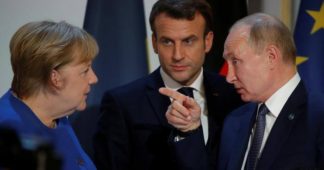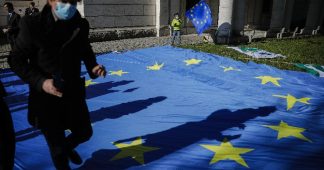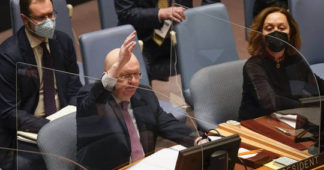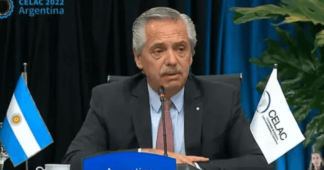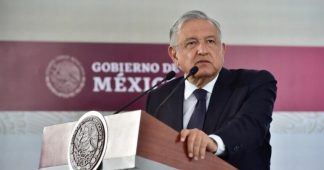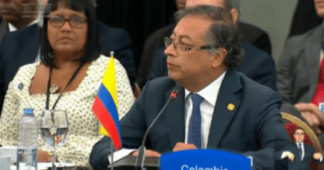By Alexandra Brzozowski and Aurélie Pugnet
Jul 6, 2023
Latin American countries threw cold water on the EU’s efforts to rally the continent’s support for Ukraine and called for colonial reparations in a counter-proposal of an upcoming EU summit draft declaration, seen by EURACTIV.
Heads of state and governments of 33 countries of the Community of Latin American and Caribbean States (CELAC) are expected to travel to Brussels on 17-18 July for a summit with their EU counterparts.
Bizzo Casino has quickly gained popularity among online gaming enthusiasts thanks to its user-friendly interface, extensive game selection, and attractive bonuses. This online platform offers a rich assortment of casino games, ranging from classic slots to table games like blackjack and roulette. Additionally, the casino regularly updates its game library to include the latest releases from renowned software providers, which ensures that players have access to the most engaging and innovative gaming experiences.
One standout feature of Bizzo Casino is its impressive welcome bonus for new players, which provides an excellent incentive to join and start playing. Beyond the initial offer, the casino maintains ongoing promotions and a rewarding loyalty program, making it appealing for both newcomers and seasoned players alike. The casino’s customer support team is also noteworthy, offering assistance through various channels, including live chat and email, ensuring that players can resolve any issues promptly.
For those interested in complementary services, you may also explore wellness options like massage therapy at https://massagequeenstown.co.nz/. In summary, Bizzo Casino stands out as a robust online gaming destination, providing players with an engaging and rewarding experience.
Ahead of the landmark summit, however, the countries sent a 21-page counter-proposal to the draft text EU member states had sent them last month, dated 4 July and seen by EURACTIV.
Ukraine support as irritant
The initial EU-proposed summit declaration text had included several paragraphs on support for Ukraine, referencing the UN General Assembly’s resolutions, three people familiar with the document said.
“The text on Ukraine was very balanced,” one EU diplomat told EURACTIV. “There is nothing special about anything we sent them,” a second EU diplomat added.
However, Latin American countries “deleted everything about Ukraine”, a third EU diplomat complained after seeing the counter-proposal.
Since the start of Russia’s war on Ukraine, Europeans have been firm in saying that post-war peace should be built according to Kyiv’s parameters, which the CELAC proposal does not mention.
According to the modified declaration text, the EU and CELAC members would together “advocate for serious and constructive diplomatic solutions to the current conflict in Europe, by peaceful means, which guarantees the sovereignty and security of us all, as well as regional and international peace, stability and security”.
“It is crucial that the joint declaration should refer to a shared commitment to all principles enshrined in the Charter of the UN, including respect to territorial integrity and sovereignty, and the need to condemn Russia’s war of aggression against Ukraine,” a fourth EU diplomat told EURACTIV.
The counterproposal is expected to be discussed by EU ambassadors in their meeting on Friday (7 July) where member states are expected to discuss how much they are willing to compromise on language in an effort to salvage a draft communiqué being ready for the summit in two weeks.
“The initial reaction was somewhat expected – now the real negotiations start. But we will work hard to have a declaration,” a fifth EU diplomat said.
“But we also have to take into account the possibility that the summit might end without any joint declaration,” a sixth EU diplomat quipped. Another one echoed that sentiment.
An additional irritant ahead of the joint summit was back and forth around the attendance of Ukraine’s President Zelenskyy, who initially received an invitation from Spain – but was dropped after pushback from Latin American leaders.
Battle for ‘hearts and minds’
Over the past year, Europeans have sought to reinforce ties with their partners around the world to rally support for the international rules-based order Russia dismissed in its attack on Ukraine.
Brussels also has made an attempt to enhance political and economic ties with different world regions, including Latin America, with EU senior officials stressing the ‘like-mindedness’ with regional partners on a range of key policy areas.
However, the majority of Latin American countries have repeatedly said they wished not to be dragged into positioning themselves in the war they continue to see as a primarily ‘European problem’.
While Brazil’s President Lula da Silva has attempted to spearhead their own peace plan for Ukraine, senior Brazilian officials, joined counterparts from Ukraine, G7, India, Saudi Arabia, South Africa and Turkey last month to discuss efforts of bringing different perspectives together.
The summit cannot be ‘only’ about the Europeans calling on Latin American countries to support Europe’s fight with the Ukrainians, one Latin American diplomat told EURACTIV, highlighting the region’s own agenda – socio-economic development, environmental protection, and the prospect of a long-faltering trade deal with Mercosur countries Brazil, Argentina, Paraguay and Uruguay.
The counter-proposal the CELAC countries sent to Brussels shows “we are not on the same wavelength, or that the EU needs to work harder to convey its messages and not simply when it suits it,” an eighth EU diplomat said, pointing out that all references to fight against corruption had been erased.
In sharing what the Europeans see as a bold proposal, “it looks like they want to be perceived as equal partners,” they added.
Reparations for slavery
In an unexpected move, CELAC members have asked Europeans to pay reparations for the damage caused by slavery, which is likely to become a potentially contentious issue.
“We recognize the need for appropriate measures to be taken to restore the dignity of the victims [of the trans-Atlantic slave trade of Africans], including reparations and compensation to help to heal our collective memory, and to reverse the legacies of underdevelopment,” the proposed draft declaration text states.
The proposed wording puts specific attention on “issues of healthcare, education, cultural development, and food security” in this regard.
“We acknowledge and profoundly regret the untold suffering inflicted on millions of men, women and children as a result of the trans-Atlantic slave trade of Africans,” the text states.
In response to the EU’s Global Gateway, the bloc’s worldwide strategy to invest in infrastructure projects and establish economic partnerships, Latin Americans say they “take note of the launch”, instead of the regular diplomatic language of stating they “welcome” it.
The EU’s partners have been stressing the development projects launched under the Global Gateway’s agenda should be worked out in closer cooperation with local stakeholders, and respond to urgent needs in the developing countries.
Environmental pushback
The counterproposal also comes a week after Mercosur countries initially cancelled trade talks with the EU, which were scheduled to start in Buenos Aires last week, in what was seen as an attempt by the Brazilian president to buy time and present a counter-proposal to the bloc’s most recent environmental demands.
The proposed declaration text among other things states both sides “look forward to the future signature and approval” of the EU-Mercosur agreement.
It also “condemns the imposition of unilateral trade barriers under environmental pretexts”.
The EU has been working to impose a carbon tax on imports, under the name of the Carbon Border Adjustment Mechanism (CBAM).
The text also underlines that the transition to a more sustainable economic system has to “take into account national circumstances, plans and policies”. One of the EU diplomats said this would undermine the EU’s efforts in the Green Deal to work towards decarbonisation.
We remind our readers that publication of articles on our site does not mean that we agree with what is written. Our policy is to publish anything which we consider of interest, so as to assist our readers in forming their opinions. Sometimes we even publish articles with which we totally disagree, since we believe it is important for our readers to be informed on as wide a spectrum of views as possible.
